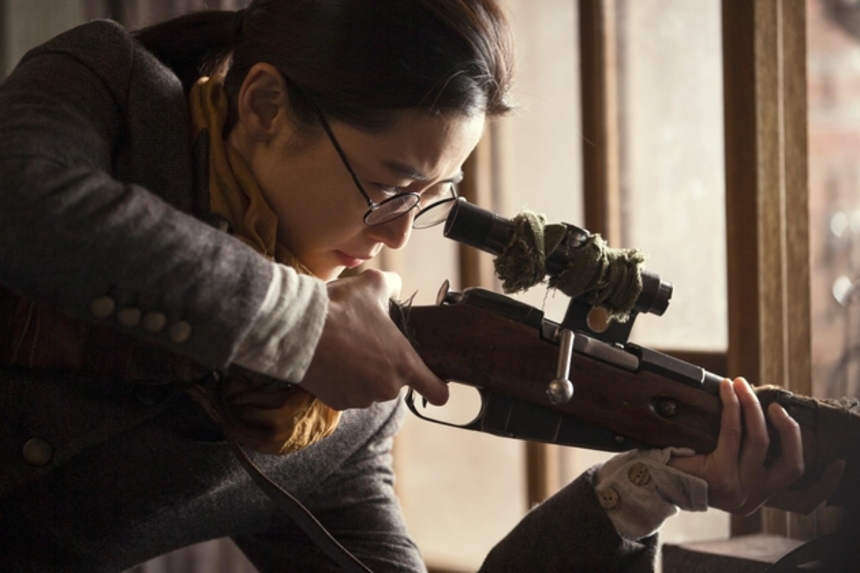Review: ASSASSINATION Shoots Up A Storm With Stuffed To The Gills Spy Yarn

What has so far been a slow year for Korean cinema is about to get a huge shot of adrenaline as Assassination, the latest from Choi Dong-hoon, is set to storm the stage and usher in the high season at the local box office. A considerable chunk of the country's biggest stars throw themselves into the director's high octane Colonial Era action-thriller that swaps out his usual caper shenanigans for an operatic espionage yarn.
In the 1930s, an agent from the exiled Provisional Government of the Republic of Korea, which is headquartered in Shanghai, pulls together a team of independence fighters consisting of top sharpshooter Ok-yoon and her partners Big Gun and explosives expert Deok-sam. Their mission is to wipe out some military figures and a high-standing Japanese sympathizer in Seoul. The only thing stopping them is hired gun Hawaii Pistol and his partner Young-gam, who have been contracted to take out the team.
Korean cinema has proven its ability to perform at the top level time and again, and Assassination is another step forward for its technical prowess. Grand and sublimely mounted, it's a terribly impressive feat, however, the ornateness of its design also bleeds into the project as a whole, at times rendering it unwieldy. Choi places a lot of emphasis on history, but not half as much as he does on guns and bullets. With its epic scope and story of a nation's struggle to gain independence against a brutal oppressor, the film seeks to tickle a nationalist itch, but the saga on display here is complicated and burdened by too many characters, some that you may have forgotten about when they return later in crucial scenes.
Bodies hit the floor and sets are strewn with bullet holes from the very start and the many set pieces that follow each upstage one another, adding more guns, bigger explosions, grander sets and more mayhem. Though slow-mo is used sparingly, the action tends towards the balletic, with lithe gunslingers gracefully contorting themselves through locations that splinter and crumble all around them.
Visually arresting, thrilling and easy to follow, the level of action on display in Assassination is of a high order and has few parallels in Korean cinema. If it falls just short of being completely satisfying, it's because we are never given the opportunity to become fully invested in the characters. The problem lies within its complex narrative and a reliance on contrived plot twists. During an overstuffed 140-minute narrative that drags at times, particularly as a series of neat climaxes push the film beyond its natural ending point, it never quite reaches the emotional peaks it strives for.
What isn't an issue is the casting, which is excellent across the board. Much like he did with his previous blockbuster The Thieves (2012), Choi has assembled a veritable who's who of the local film scene, including returning stars Gianna Jun, Lee Jung-jae, Oh Dal-su and Kim Hae-sook, and new faces Ha Jung-woo, Cho Jin-woong and Lee Kyoung-young.
In her most challenging role to date, Gianna Jun (aka Jun Ji-hyun) is convincing as a precision sniper with mettle, conviction and still plenty of vulnerability. Playing Hawaii Pistol, Ha Jung-woo doesn't show us anything he hasn't before, but his confident and effortlessly cool turn cements his status as Korea's answer to Paul Newman. Rounding out the leads is Lee Jung-jae, who has grown tremendously as a performer in recent years and navigates a tricky character trajectory with aplomb and the same deep-pitched cadence he used in The Face Reader (2013). Meanwhile, Oh Dal-su and Cho Jin-woong provide terrific support and most of the film's humor.
Also delivering the goods are cinematographer Kim Woo-hyung and lighting director Kim Seung-gyu, who lend a rich, redolent tone to both the location photography (some of it in Shanghai) and studio-shot scenes, and legendary production designer Ryu Seung-hee (Oldboy, 2003), who contributes beautiful and richly detailed sets. Less successful is the uneven scoring from Dalparan and Jang Young-gyu, which spans an array of genres and tones that don't always sit comfortably with what's happening on screen.
It doesn't come together as a completely satisfying package but Assassination is frequently compelling and packed with standout moments, including the sight of a heavily moustachioed Oh Dal-su chomping down on a cigar as he lets loose with a tommy gun in 1930s Shanghai. A brief appearance by a French Inspector Melville is also a nice nod to Choi's influences, and one can certainly detect a hint of Alain Delon in the film's central assassins.







